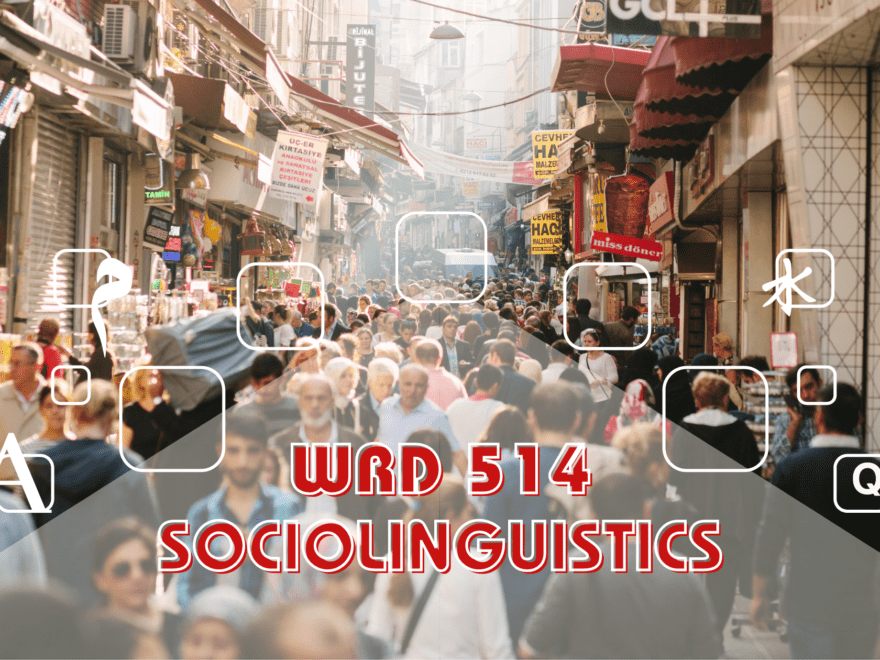Overview of WRD 514
In Autumn Quarter 2024, Dr. Jason Schneider will teach another section of WRD 514: Sociolinguistics. This introduction to the study of sociolinguistics explores language as a social phenomenon, with particular focus on the ways that language practices intersect with place, power, identity, gender, and race. Graduate students will have the opportunity to engage with theoretical readings and case studies that provide a range of perspectives in the field.
The course will be offered as five sessions in-person on campus (in odd-numbered weeks) and five sessions synchronous Zoom meetings (in even-numbered weeks).
Students interested in teaching language and/or writing, those planning to further study language, and even those simply interested in how language shapes the world around us should take special interest in this course. Read on to learn more about how WRD 514 will help you learn new frameworks for how to analyze the role of language in everyday life.
Course Projects
WRD 514 incorporates several small-scale and large-scale assignments. Each week, students will create a weekly reading response synthesizing ideas from the week’s materials, which cover sociolinguistics topics primarily in the United States. In conjunction, students will take turns leading in-class discussions to understand course materials more deeply.
There are two papers as well: a discourse analysis paper and a summary-response paper discussing a sociolinguistics book. In the discourse analysis paper, students choose a specific type of language and explore how it achieves goals and constructs ideas. In the Spring Quarter 2023 iteration of WRD 514, topics included mental-health related posts on Christian blogs and the speech patterns of contestants on the reality TV show Love Island UK. The summary-response paper offers several book options, which last year included (among others) Talking Indian: Identity and Language Revitalization in the Chickasaw Renaissance by Jenny Davis and How We Talk About Language: Exploring Citizen Sociolinguistics by Betsy Rymes.
At the end of the course, the final project engages students in a sociolinguistic topic of their choice, which they can develop in a rhetorically relevant format (website, traditional academic paper, original format, or reflection on how sociolinguistic issues relate to students’ own experiences and career choices).
Student Perspectives
While each iteration of a course is different, students from previous WRD 514 cohorts have appreciated the unique lessons the course offers. Below are three perspectives from MAWRD students who completed the course in Spring Quarter 2023.
Eryk Markiewicz took the course while in his fourth year of the combined BA/MA track, and was especially interested in the course’s explorations of how language shapes social identity. He shares, “Sociolinguistics was invaluable in teaching me the words and concepts to describe my experiences as a heritage bilingual speaker. The class underlines the interwoven nature of language and society, and led me to critically examine the expressions of that relationship in my everyday life.”
Andrea Hamler, a first-year MAWRD student, also found the course meaningful for her life outside of the classroom. She shares, “Learning methods to analyze linguistic frameworks was very empowering for me. I frequently get hunches about what’s going on in linguistic power structures, but it was difficult for me to express this in a way that other people could understand. I appreciated the opportunity to put this new knowledge into practice as a classmate and I completed a discourse analysis on evangelical blogs’ treatment of mental health and mental illness.”
I was able to take this course as well, and I loved how our cohort had students from different programs at the university, including English, Education, and WRD. This brought a diversity of perspectives to the course that enriched our conversations on the function of language in shaping social class, political ideals, and other aspects of our own lives. In addition, I learned so much from the book I read for the summary-response paper, Talking Indian: Identity and Language Revitalization in the Chickasaw Renaissance, and another book we began in class that I ended up reading in full as well called Homegirls: Language and Cultural Practice Among Latina Youth Gangs. These and other readings helped me connect dots between other courses I had taken in rhetoric and language teaching. Finally, I appreciated that the final project was an open-ended opportunity. This allowed me to explore a sociolinguistic topic that I am fascinated by, and that intersects with much of my other scholarship: the study of ecolinguistics and its role in conservation efforts.
Conclusion
If these sound like topics of interest, register for the Autumn Quarter 2024 section of WRD 514 in Campus Connect! Stay up to date with upcoming program offerings through the WRD Blog’s Course Spotlights.
